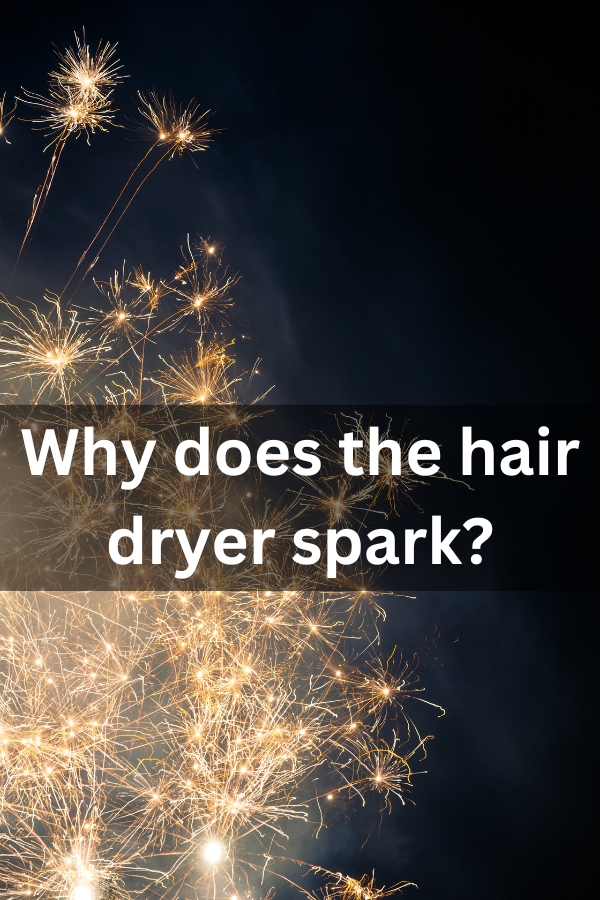You’re standing in front of the mirror, ready to conquer the world with a fabulous hair day. You plug in your trusty blow dryer, hit the switch, and suddenly, you’re treated to an unexpected fireworks show! Yep, you guessed it – we’re talking about those little fiery sparks that occasionally decide to make an appearance while you’re styling your locks. Why does my blow dryer spark? You asked! So, sit back, relax, and prepare to uncover the electrifying mysteries of why your blow dryer sometimes sparks like a tiny, mischievous lightning bolt!

Why does the hair dryer spark?
It’s attempting to communicate with Morse code, sending you a secret message: “S.O.S. – Save Our Styling!” :))
Joking aside, when a hair dryer sparks, it can be a cause for concern and should not be ignored. The sparks can be an indication of underlying issues or defects within the hair dryer. The following reasons can explain why a hair dryer may spark:
Defective Electrical Components
Hair dryers can spark if they contain defective electrical components. This could be due to manufacturing defects or wear and tear over time. When these components malfunction, they can create sparks during operation.
Accumulation of Dust and Debris
Another common cause of sparking in hair dryers is the accumulation of dust, hair, or other particles within the dryer. If these particles come into contact with the heating element, they can cause sparks.
It’s important to note that when a hair dryer sparks, it can pose a fire hazard and potentially cause burns or other injuries. Sparks can come into contact with flammable items such as hair, clothing, or nearby objects, increasing the risk of accidents.
If you notice your hair dryer sparking, it is crucial to stop using it immediately for safety reasons. Continuing to use a sparking hair dryer can pose serious risks, including the possibility of electric shock or further damage to the appliance.
More: Why Is My Blow Dryer Not Getting Hot?
Potential risks of hair dryer sparks
Hair dryer sparks can pose several potential risks, which are important to understand and address promptly to ensure safety. Here are the potential risks associated with hair dryer sparks:
Burns
Hair dryer sparks can lead to burns if they come into contact with your skin or flammable materials nearby. The sparks can cause heat and flames, which can result in painful burns.
Electrical hazards
Sparking in a hair dryer indicates a potential electrical issue. It can pose a risk of electric shock if you touch the sparking parts or if moisture is present. Water conducts electricity, so dropping a hair dryer in water can be especially dangerous and potentially lethal. Also, light can be dimmed when using hair dryers.
Fire hazards
When hair dryers spark, there is an increased risk of fire, particularly if there are faulty wires or if flammable particles, such as dust or debris, come into contact with the heating element. Sparks can ignite these particles and lead to a fire.
Property damage
Hair dryer sparks can potentially cause damage to your property, such as burning or scorching surfaces, fabrics, or nearby objects. This can result in expensive repairs or replacements.
To mitigate these risks, it is important to take preventive measures and address hair dryer sparking issues promptly. Regularly clean and maintain your hair dryer, paying particular attention to the filters to prevent the accumulation of dust and debris that can contribute to sparks. Avoid using high speed and heat settings that can accelerate the problem. If you notice sparks or a burning smell, stop using the hair dryer immediately and seek professional repair or replacement.
Additionally, it is essential to prioritize safety when purchasing and using a hair dryer. Buy from reputable retailers, follow the manufacturer’s instructions, and register your hair dryer with the manufacturer for potential safety notices or recalls. Regularly inspect plugs and sockets for any signs of damage or overheating, and unplug the hair dryer when not in use. Avoid using the hair dryer near water or in the bath and never leave it unattended. Installing residual current device (RCD) protection can provide an added layer of safety against electric shocks and fires.
By understanding the potential risks and taking appropriate precautions, you can ensure a safer hair-drying experience and minimize the chances of accidents or property damage.
How to prevent hair dryer from sparking
To address the issue and prevent further sparking, consider the following steps:
Check the Filters
Regularly clean and maintain the filters of your hair dryer to prevent the accumulation of dust and debris. Cleaning the filters can help maintain proper airflow and reduce the chances of sparking.
Avoid High Speed and Heat Settings
Using high-speed and high-heat settings on your hair dryer can accelerate the accumulation of particles and increase the risk of sparking. Opt for lower settings when possible to minimize the strain on the appliance.
If you’re unable to resolve the sparking issue or if it persists, it is advisable to discontinue using the hair dryer and either replace it with a new one or consult a professional for repair. Ignoring the problem can lead to further damage or potential hazards.
Always prioritize safety when it comes to electrical appliances. If you have specific concerns or if your hair dryer belongs to a brand that has been subject to recalls or complaints regarding sparking issues, it is recommended to reach out to the manufacturer for further guidance.
Why does my hair dryer buzz when I plug it in?
If your hair dryer buzzes when you plug it in, there could be a few possible reasons for this occurrence. Here are some factors to consider:
Normal electrical operation
When you plug in an appliance like a hair dryer, it is common to hear a faint buzzing or humming sound. This is a normal occurrence caused by the flow of electricity through the device. When electricity flows through a conductor, such as the wiring in the hair dryer, it creates a magnetic field, resulting in the vibration of electrons and the buzzing sound.
Loose connections or faulty outlet
Another possibility is that the buzzing noise is not coming from the hair dryer itself but from the electrical outlet or the connection between the plug and the outlet. Loose connections within the outlet or a broken connection can cause buzzing or humming sounds. If you suspect this is the case, it is recommended to have a professional electrician inspect the outlet and wiring to ensure safety.
Hair dryer malfunction
In some cases, the buzzing sound could indicate a problem with the hair dryer itself. It might be due to a faulty internal component or a loose part within the device. If the buzzing sound persists or is accompanied by other issues like reduced performance or unusual smells, it is advisable to discontinue use and have the hair dryer inspected or repaired by a qualified professional.
Tinnitus
It is worth mentioning that if you hear a buzzing sound but no one else around you can hear it, it is possible that the buzzing is not related to the hair dryer at all. Tinnitus is a condition characterized by the perception of ringing or buzzing sounds in the ears, even in the absence of external noise. If you consistently hear buzzing or other phantom noises in your ears, it is recommended to consult a healthcare professional for evaluation and guidance.
Final thoughts
While a slight buzzing sound when you plug in a hair dryer is typically normal, persistent or loud buzzing, along with other signs of malfunction, may indicate an issue with the hair dryer itself. If you suspect a problem, it is best to consult a professional for further assessment and possible repairs.


